Plot
This article needs a plot summary.(February 2024) |
| Spellbound | |
|---|---|
| Directed by | Harry Harvey |
| Written by | Bess Meredyth |
| Produced by |
|
| Starring | Lois Meredith William Conklin Bruce Smith |
Production company | |
| Distributed by | General Film Company |
Release date |
|
| Country | United States |
Spellbound or The One-Eyed God, [1] is a 1916 American crime drama silent black and white film directed by Harry Harvey and produced by E.D. Horkheimer and H.M. Horkheimer. [2] It is written by Bess Meredyth. [3]
With another numerous films, Spellbound appropriated the medical, legal and literary tales of hypnotic crime. [4] Oscar Cooper, in his review for Motion Picture News , doesn't bother to comment the story and acting and he offers some praise for the lighting and photography. [5] The Salt Lake Tribune claimed that the fantastic story did not preclude at least one nod to reality. [6]
This article needs a plot summary.(February 2024) |

Betty Compson was an American actress and film producer who got her start during Hollywood's silent era. She is best known for her performances in The Docks of New York and The Barker, the latter of which earned her an Academy Award nomination for Best Actress.

Essanay Studios, officially the Essanay Film Manufacturing Company, was an early American motion picture studio. The studio was founded in 1907 in Chicago by George Kirke Spoor and Gilbert M. Anderson, originally as the Peerless Film Manufacturing Company, then as Essanay on August 10, 1907. Essanay is probably best known today for its series of Charlie Chaplin comedies produced in 1915-1916. In late 1916, it merged distribution with other studios and stopped issuing films in the fall of 1918. According to film historian Steve Massa, Essanay is one of the important early studios, with comedies as a particular strength. Founders Spoor and Anderson were subsequently awarded special Academy Awards for pioneering contributions to film.

London After Midnight is a lost 1927 American silent mystery horror film directed and co-produced by Tod Browning and starring Lon Chaney, with Marceline Day, Conrad Nagel, Henry B. Walthall and Polly Moran. The film was distributed by Metro-Goldwyn-Mayer, and was written by Waldemar Young, based on the story "The Hypnotist" which was written by Browning. Merritt B. Gerstad was the cinematographer, and the sets were designed by Cedric Gibbons and Arnold Gillespie. Harry Sharrock was the assistant director. The film cost $151,666.14 to produce, and grossed $1,004,000. Chaney's real-life make-up case can be seen in the last scene of the film sitting on a table, the only time it ever appeared in a film.
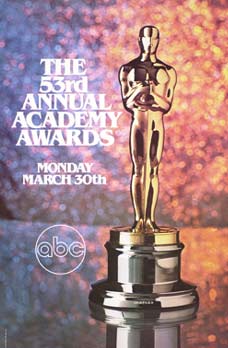
The 53rd Academy Awards ceremony, organized by the Academy of Motion Picture Arts and Sciences (AMPAS), honored films released in 1980 and took place on March 31, 1981, at the Dorothy Chandler Pavilion in Los Angeles, beginning at 7:00 p.m. PST / 10:00 p.m. EST. The ceremony was scheduled to take place originally on the previous day but was postponed due to the attempted assassination of Ronald Reagan. During the ceremony, AMPAS presented Academy Awards in 20 categories. The ceremony, televised in the United States by ABC, was produced by Norman Jewison and directed by Marty Pasetta. Comedian and talk show host Johnny Carson hosted the show for the third consecutive time. Two weeks earlier, in a ceremony held at The Beverly Hilton in Beverly Hills, California, on March 15, the Academy Scientific and Technical Awards were presented by hosts Ed Asner and Fay Kanin.

Charlotte E. Burton was an American silent film actress.

Crane Wilbur was an American writer, actor and director for stage, radio and screen. He was born in Athens, New York. Wilbur is best remembered for playing Harry Marvin in The Perils of Pauline. He died in Toluca Lake, California.
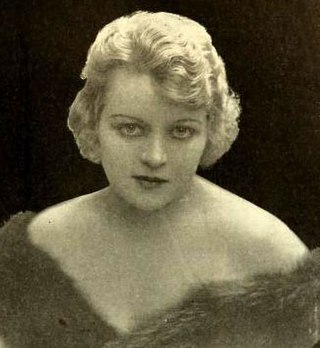
Marguerite Clayton was an American actress of the silent era. She appeared in more than 170 films between 1909 and 1928, many of which were westerns with Broncho Billy Anderson and Harry Carey.
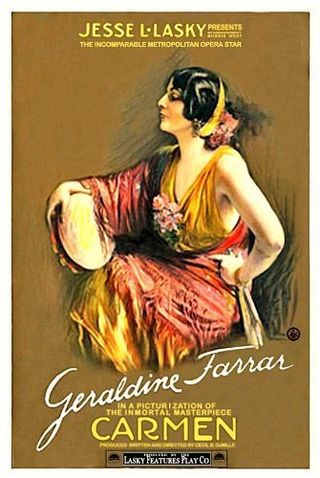
Carmen is a 1915 American silent drama film directed by Cecil B. DeMille. The film is based on the novella Carmen by Prosper Mérimée. The existing versions of this film appear to be from the re-edited 1918 re-release.

The following events occurred in January 1927:
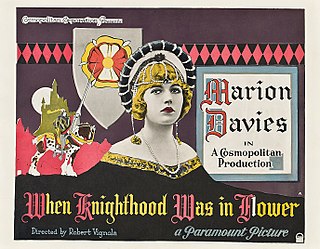
When Knighthood Was in Flower is a 1922 American silent historical film directed by Robert G. Vignola, based on the novel by Charles Major and play by Paul Kester. The film was produced by William Randolph Hearst for Marion Davies and distributed by Paramount Pictures. This was William Powell's second film. The story was re-filmed by Walt Disney in 1953 as The Sword and the Rose, directed by Ken Annakin.
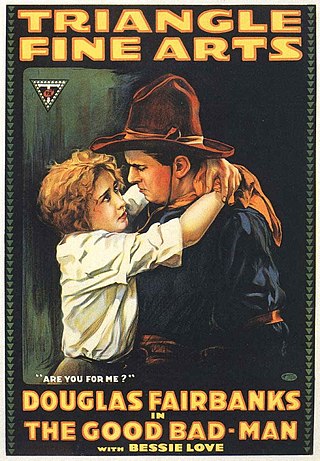
The Good Bad-Man is a 1916 American silent Western film directed by Allan Dwan. The film was written by Douglas Fairbanks, and produced by Fairbanks and the Fine Arts Film Company. It stars Fairbanks and Bessie Love.
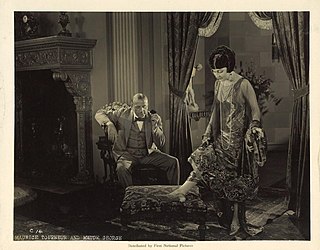
Torment is a 1924 American silent crime drama film produced and directed by Maurice Tourneur and distributed by Associated First National. This film stars Bessie Love, Owen Moore, and Jean Hersholt. The film is based on a story by William Dudley Pelley with script by Fred Myton and titles by Marion Fairfax. It is a lost film.
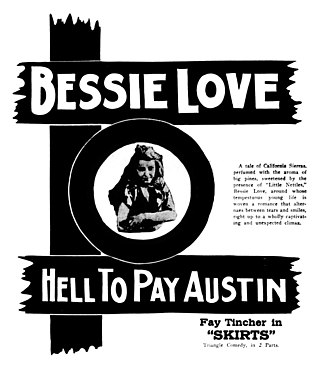
Hell-to-Pay Austin is a 1916 American silent comedy-drama film directed by Paul Powell and starring Wilfred Lucas in the title role, with Bessie Love, Eugene Pallette, and Mary Alden in supporting roles. Written by Mary H. O'Connor, the film was produced by D. W. Griffith's Fine Arts Film Company and distributed by Triangle Film Corporation. It is presumed lost.

Lucky Boy is a 1929 American sound part-talkie musical comedy-drama film directed by Norman Taurog and Charles C. Wilson, most notable for starring George Jessel in his first known surviving feature picture. In addition to sequences with audible dialogue or talking sequences, the film features a synchronized musical score, singing and sound effects along with English intertitles. The sound was recorded using the Tiffany-Tone system using RCA Photophone equipment. The film's plot bore strong similarities to that of the hit 1927 film The Jazz Singer, which had originally been intended to star Jessel before Al Jolson took over the role.

The Heiress at Coffee Dan's is a 1916 American silent comedy-drama film produced by the Fine Arts Film Company and distributed by Triangle Film Corporation. It starred Bessie Love and was directed by Edward Dillon.
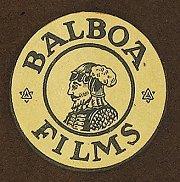
The Balboa Amusement Producing Company was a film production company in Long Beach, California, from 1913 to 1918 that produced more than 1000 films, around 90% of which have been lost.

Little Mary Sunshine is a 1916 silent movie directed by Henry King.

The Right to Be Happy is an American silent film from 1916 that draws inspiration from Charles Dickens' 1843 Novella, A Christmas Carol. This film was Universal's first attempt at making a Feature film based on Dickens' novella. Throughout the silent era, it stood as the first and only feature film adaptation of A Christmas Carol by an American or foreign film company. The movie was directed by Rupert Julian and supported by a cast of Universal Bluebird players, including Rupert Julian, Claire McDowell, and Harry Carter.

Casey at the Bat is a lost 1916 American silent sports drama film produced by Fine Arts Studios in Hollywood, directed by Lloyd Ingraham, and starring DeWolf Hopper with principal support from Marguerite Marsh, Frank Bennett, and Kate Toncray. The photoplay's scenario, written by William E. Wing, was based on Ernest Thayer's 1888 baseball poem of the same title.

Edna Hunter was an American stage and film actress of the silent film era, who appeared in more than a dozen films between 1915 and 1918.